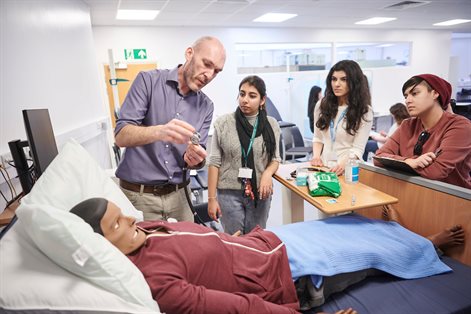Dr Greg Scutt
Dr Greg Scutt, Clinical Principal Lecturer in the University of Brighton School of Applied Sciences said:
"With eight in ten patients living within a twenty-minute walk of community pharmacies with extended opening hours compared to the local GP surgery, the Pharmacy First service represents a pivotal shift toward community pharmacies playing a more active role in healthcare delivery, benefiting patients and the healthcare system."

Dr Greg Scutt working with Brighton pharmacy students
Claire May
Claire May, Senior Lecturer in Medicines Use in the University of Brighton School of Applied Sciences said:
“The current pharmacy programmes at the University of Brighton prepare students to fit seamlessly into this scheme after their Foundation Year training and registration. Over the course of the four-year curriculum, they are equipped with the skills to undertake comprehensive patient assessment, make shared clinical decisions to inform diagnosis and decide on treatment options, and prescribe, educate, monitor and evaluate care.”
Through the teaching of supporting scientific knowledge, simulation of clinical skills and clinical application through extensive multi-sector placements, Brighton Pharmacy graduates are prepared to run diagnostics around full cardiovascular and respiratory examinations, ENT examination, amongst others taking into account evidence-based medicine and shared decision-making.”